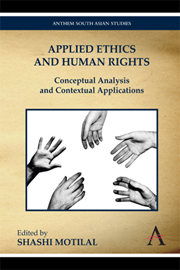Book contents
- Frontmatter
- Contents
- Preface
- Introduction
- Part One Rights, Obligations and Responsibilities
- Part Two Human Rights Issues
- 10 Fragile Identities and Constructed Rights
- 11 Affirmative Action: Compensation or Discrimination?
- 12 Ethics, Human Rights and the LGBT Discourse in India
- 13 Distributive Justice: Locating in Context
- 14 Punishment and Human Rights
- 15 Rights of the ‘Mad’ in Mental Health Sciences
- 16 Choice, Life and the (m)Other: Towards Ethics in/of Abortion
- 17 The Nationalist Project and the Women's Question: A Reading of The Home and the World and Nationalism
- 18 On the Idea of Obligation to Future Generations
- 19 Morality in Cyberspace: Intellectual Property and the Right to Information
- 20 Violence – A Right to the Survival of the Self?
- 21 ‘Moral Obligation’ to Fight for the Prevention of Greater Calamity: A Debate between Sādharana Dharma and Sva Dharma
- 22 Globalisation and Human Rights
- Notes on Contributors
16 - Choice, Life and the (m)Other: Towards Ethics in/of Abortion
from Part Two - Human Rights Issues
Published online by Cambridge University Press: 05 March 2012
- Frontmatter
- Contents
- Preface
- Introduction
- Part One Rights, Obligations and Responsibilities
- Part Two Human Rights Issues
- 10 Fragile Identities and Constructed Rights
- 11 Affirmative Action: Compensation or Discrimination?
- 12 Ethics, Human Rights and the LGBT Discourse in India
- 13 Distributive Justice: Locating in Context
- 14 Punishment and Human Rights
- 15 Rights of the ‘Mad’ in Mental Health Sciences
- 16 Choice, Life and the (m)Other: Towards Ethics in/of Abortion
- 17 The Nationalist Project and the Women's Question: A Reading of The Home and the World and Nationalism
- 18 On the Idea of Obligation to Future Generations
- 19 Morality in Cyberspace: Intellectual Property and the Right to Information
- 20 Violence – A Right to the Survival of the Self?
- 21 ‘Moral Obligation’ to Fight for the Prevention of Greater Calamity: A Debate between Sādharana Dharma and Sva Dharma
- 22 Globalisation and Human Rights
- Notes on Contributors
Summary
‘… it is always in a dilemma and a certain non-knowledge … as to what it would be best to do, it is at the moment when two contradictory imperatives are in competition, that a responsible freedom can be exercised as such.’
Derrida (2002 b)After Foucault with the too well known intertwining of knowledge and power and after Said with his indictments of the colonizing impulse of knowledge it might be easy to point at the exclusions and the latent coerciveness of ‘universal rights’. At the level of its working, to show the dominance of the international financing organizations based on the northern countries and the diverse overt and covert ways in which these dictate the terms of understanding, control and day to day activities in the nation states of the south. In this transfer/translation of knowledge, power and economy, the roles of the various non-governmental organizations (NGOs), of well-meaning individuals and globalized functionaries of the state and techno scientific institutions along with certain ‘local’ level initiatives are gradually becoming clearer. Detailed analyses and critical descriptions of the dynamics of these efforts are crucial, yet do not exhaust the problem. The conceptual issues involved must be unravelled (I do not propose this as an easy and self-congratulatory positivist gesture but in the deconstructive spirit of attempting the (im)possible yet unavoidable task of unwinding the ever-tangled loop of thinking, being and doing, of taking the risk of decisions, however contingent, where it is impossible to decide).
- Type
- Chapter
- Information
- Applied Ethics and Human RightsConceptual Analysis and Contextual Applications, pp. 219 - 236Publisher: Anthem PressPrint publication year: 2010



